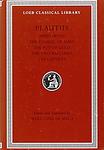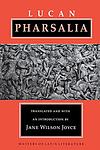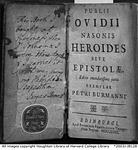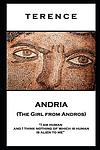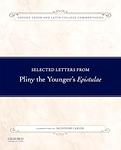The Greatest Roman "Ancient Literature" Books of All Time
Click to learn how this list is calculated.
This list represents a comprehensive and trusted collection of the greatest books. Developed through a specialized algorithm, it brings together 300 'best of' book lists to form a definitive guide to the world's most acclaimed books. For those interested in how these books are chosen, additional details can be found on the rankings page.
Genres
Ancient Literature refers to the body of written works produced during the earliest periods of human history, typically up until the fall of the Roman Empire in the 5th century AD. This category encompasses a diverse array of texts, including religious scriptures, epic poetry, philosophical treatises, historical accounts, and dramatic plays, originating from various civilizations such as the Sumerians, Egyptians, Greeks, Romans, Chinese, and Indians, among others. Notable works within this genre include the "Epic of Gilgamesh," Homer's "Iliad" and "Odyssey," the plays of Sophocles and Euripides, the philosophical writings of Plato and Aristotle, the "Mahabharata" and "Ramayana" from India, and the foundational texts of Confucianism and Taoism in China. Ancient literature provides invaluable insights into the thoughts, beliefs, and cultural practices of early societies, and continues to influence modern storytelling, philosophy, and ethics.
Countries
Date Range
Reading Statistics
Click the button below to see how many of these books you've read!
Download
If you're interested in downloading this list as a CSV file for use in a spreadsheet application, you can easily do so by clicking the button below. Please note that to ensure a manageable file size and faster download, the CSV will include details for only the first 500 books.
Download-
1. The Aeneid by Virgil
This epic poem tells the story of Aeneas, a Trojan who travels to Italy, where he becomes the ancestor of the Romans. It includes a series of prophecies about Rome's future and the deeds of heroic individuals, and is divided into two sections, the first illustrating the hero's journey and the second detailing the wars and battles that ensue as Aeneas attempts to establish a new home in Italy. The narrative is deeply imbued with themes of duty, fate, and divine intervention.
-
2. Metamorphoses by Ovid
"Metamorphoses" is a classical epic poem that narrates the history of the world from its creation to the deification of Julius Caesar within a loose mythico-historical framework. The narrative is filled with stories of transformation, focusing on myths and legends of the Greek and Roman world. The tales, which include the stories of Daedalus and Icarus, King Midas, and Pyramus and Thisbe, among others, are all linked by the common theme of transformation, often as a punishment or reward from the gods.
-
3. De Rerum Natura by Lucretius
"De Rerum Natura" is a long didactic poem written in the first century BC, which explores Epicurean philosophy and the nature of the universe. The text delves into topics such as the nature of the gods, the atomic structure of the universe, human sensation and thought, and the fear of death. The author argues that understanding the physical world can free humans from superstition and fear, leading to peace of mind and true happiness.
-
4. The Golden Ass (Metamorphoses): Or Metamorphoses by Apuleius
This classic novel follows the protagonist, a young man who is transformed into a donkey after meddling with magic he doesn't understand. His journey takes him through a series of adventures, where he encounters a variety of characters from different walks of life and gets into all sorts of trouble. Through his experiences, he gains a deeper understanding of the human condition and the world around him. The narrative also includes several mythological tales and allegories, including the famous story of Cupid and Psyche. Eventually, the protagonist regains his human form through divine intervention, having learned valuable lessons about life, love, and humanity.
-
5. The Odes by Horace
"The Odes" is a collection of lyric poems by an ancient Roman poet. The poems cover a wide range of themes, including love, friendship, wine, nature, morality, and the human condition. The author's style is noted for its elegance, wit, and mastery of meter. The poems also reflect the social and political context of Rome during the author's lifetime, providing insight into the culture and values of the period.
-
6. Letters from a Stoic by Seneca
"Letters from a Stoic" is a collection of moral epistles written by a renowned Stoic philosopher. The letters provide practical guidance on everything from dealing with adversity and the pursuit of wisdom to the folly of consumerism and the nature of friendship. The author's stoic philosophy encourages peace of mind through understanding and accepting the natural order of the universe, and his letters offer timeless wisdom and insights that are still relevant today.
-
7. Titi Livi Ab urbe condita libri by Livy
This historical work offers a comprehensive narrative of the history of Rome, from its mythical origins to the reign of the Roman Emperor Augustus. The author chronicles the major political, military, and social events of the Roman Republic, including the founding of the city, the establishment of the Republic, the Punic Wars, and the rise of Julius Caesar. The book is a significant source of information about the early history of Rome and is often considered one of the most important works of Roman history.
-
8. Poetry by Quintus Lutatius Catulus
This book is a collection of ancient Roman poetry by a renowned statesman and poet. The poems reflect the author's experiences, thoughts, and feelings about life, love, politics, and society during the Roman Republic era. The author's eloquent and vivid writing style, combined with his astute observations and insights, make this book a valuable resource for understanding Roman culture and history.
-
9. Natural History by Pliny (the Elder)
"Natural History" is an extensive work of literature that provides a comprehensive look at the knowledge of the natural world during the Roman era. The book is divided into 37 volumes, each focusing on different aspects such as geography, anthropology, zoology, botany, and mineralogy. The author's curiosity and fascination with the world are evident in his detailed observations and descriptions. The book also includes discussions on art, sculpture, and various other topics, providing a rich and detailed snapshot of the Roman understanding of the world.
-
10. On Obligations by Marcus Tullius Cicero
"On Obligations" is a philosophical treatise that explores the ethical and moral duties of individuals in society. Written in the form of a dialogue, the text delves into the nature of justice, the importance of the common good, and the role of virtue in personal and public life. The author articulates a framework for understanding and fulfilling one's obligations, which he argues are derived from both natural law and human reason. Through a detailed examination of various ethical dilemmas and practical situations, the work provides insights into how individuals should act with integrity and wisdom to uphold both legal and moral responsibilities.
-
11. On The Ends Of Good And Evil by Marcus Tullius Cicero
"On the Ends of Good and Evil" is a philosophical work that explores the ethical theories of Hellenistic schools, including Stoicism, Epicureanism, and the Peripatetic tradition. Through a series of dialogues, the text delves into the nature of happiness and the ultimate end of human action, examining what constitutes the highest good. The author critiques and compares the doctrines of these schools, ultimately defending the Stoic view that virtue is the sole basis of happiness and the ultimate goal in life, while also acknowledging valuable insights from other philosophical traditions.
-
12. Thyestes by Seneca
"Thyestes" is a classic tragedy that centers around the mythological figures of the House of Atreus. The story unfolds as Atreus, the King of Mycenae, seeks revenge on his brother Thyestes for committing adultery with his wife. In a gruesome act of vengeance, Atreus kills Thyestes' sons and serves them to him at a feast. The narrative explores themes of power, betrayal, revenge, and the horrific consequences of unchecked ambition.
-
13. Amphitryon by Plautus
The play is a comedic tale set in ancient Greece, where the god Jupiter, enamored with Alcmena, the wife of the general Amphitryon, takes on her husband's form to seduce her while Amphitryon is away at war. Meanwhile, Mercury, the messenger god, assists Jupiter by disguising himself as Amphitryon's slave, Sosia. The resulting confusion and mistaken identities lead to a series of humorous situations, as the real Amphitryon returns home to find his place usurped by the god. The play explores themes of deception, infidelity, and the interplay between gods and mortals, all wrapped up in a farcical package that entertains while it provokes thought about the nature of identity and trust.
-
14. Pharsalia by Lucan
"Pharsalia," also known as "The Civil War," is an epic poem that delves into the intense and tumultuous period of the Roman Republic's downfall, focusing on the conflict between Julius Caesar and Pompey the Great. The narrative, rich in rhetorical and dramatic elements, presents a grim and philosophical reflection on the nature of power, the moral decay of Rome, and the catastrophic consequences of civil strife. Through its vivid and often gruesome depictions of battles, political intrigue, and the personal ambitions that drive men to treachery and violence, the poem serves as a cautionary tale about the fragility of political systems and the human cost of war.
-
15. Heroides by Ovid
The book is a collection of fifteen epistolary poems presented as though written by various mythological heroines of Greek and Roman lore to their absent lovers. These letters express the women's emotions as they lament their separation, recount their memories, and plead for their lovers' return. The work explores themes of love, betrayal, and the female perspective within the context of classical myths, offering a unique insight into the emotional lives of characters such as Penelope, Dido, and Medea, who are traditionally depicted through the eyes of male heroes and writers.
-
16. On The Gods by Marcus Tullius Cicero
The book is a philosophical treatise that explores ancient theological concepts and the nature of the gods, presenting a critical examination of various religious beliefs and practices of the time. The author, a Roman statesman and scholar, engages in a series of dialogues that delve into the existence and attributes of the divine, contrasting the Epicurean view of detached gods with the Stoic belief in a providential order. Through rigorous argumentation and eloquent rhetoric, the work seeks to understand the role of the gods in human life and the universe, while also reflecting on the implications of piety, fate, and the pursuit of happiness within the context of Roman religion and philosophy.
-
17. The Girl From Andros by Terence
"The Girl From Andros" is a classic Roman comedy that revolves around the complexities of love and mistaken identity. The plot centers on a young Athenian man who falls in love with a girl believed to be a courtesan from the island of Andros, but who is, in fact, a freeborn woman. As he seeks to marry her, he must navigate the social expectations of his status, the interference of his slave who tries to help him with a cunning plan, and the revelation of the girl's true identity. The play humorously explores themes of class, romance, and the roles of women in ancient society, all while employing the typical misunderstandings and deceptions of comedic storytelling.
-
18. Epistulae by Pliny the Younger
"Epistulae" is a collection of personal correspondence written by a prominent lawyer and author from ancient Rome. These letters provide a detailed insight into the social, political, and domestic aspects of Roman life during the late first and early second centuries. The author writes about a wide range of topics, from descriptions of daily routines and domestic affairs to significant events of the time, including the eruption of Mount Vesuvius. The letters are valued not only for their literary elegance but also for their detailed historical accounts and personal reflections, offering a unique glimpse into the author's character and the times in which he lived.
-
19. The Brothers Menaechmus by Plautus
"The Brothers Menaechmus" is a classic Roman comedy that revolves around the hilarious misunderstandings and chaotic events that ensue from a case of mistaken identity. The plot follows the story of two long-lost twin brothers, Menaechmus of Epidamnus and Menaechmus of Syracuse, who were separated in childhood. Unbeknownst to each other, they end up in the same city, where their identical appearances lead to a series of comedic mishaps. Friends, family, and even a wife are all deceived as the twins inadvertently swap places, causing confusion and prompting a comical investigation into apparent infidelity, theft, and madness before the truth is finally revealed and the siblings are joyously reunited.
Reading Statistics
Click the button below to see how many of these books you've read!
Download
If you're interested in downloading this list as a CSV file for use in a spreadsheet application, you can easily do so by clicking the button below. Please note that to ensure a manageable file size and faster download, the CSV will include details for only the first 500 books.
Download










